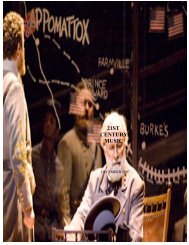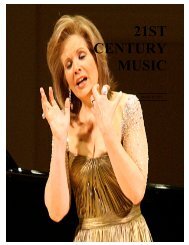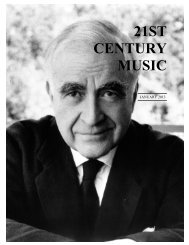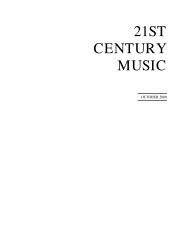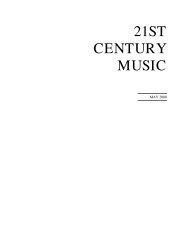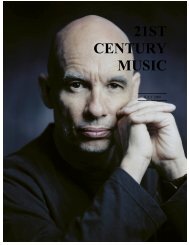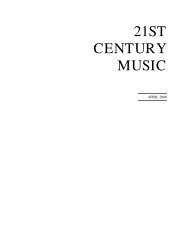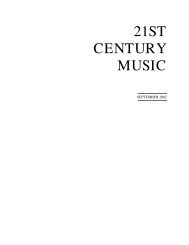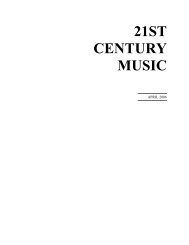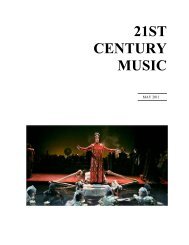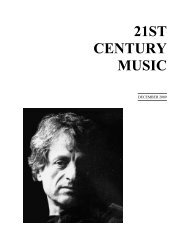Create successful ePaper yourself
Turn your PDF publications into a flip-book with our unique Google optimized e-Paper software.
Book Reviews<br />
America's "Royal" College of <strong>Music</strong><br />
RICHARD KOSTELANETZ<br />
Andrea Olmstead. Juilliard: A History. Urbana: University of<br />
Illinois, 1999. 368 pp, $37.50<br />
For everyone who needs to know, Juilliard has been for the<br />
past century the most successful arts college in any art in<br />
America. One convenient measure of its success is the number<br />
of distinguished alumni in various areas, including in music<br />
alone: Richard Rodgers, Van Cliburn, Billy Strayhorn, Philip<br />
Glass, James Levine, Miles Davis, Tito Puente, Yo-Yo Ma,<br />
Itzhak Perlman, Paul Zukofsky, Peter Schickele, and Midori,<br />
which is to say classical composers along with jazz and<br />
Broadway greats, avant-garde instrumentalists along with<br />
concert-hall superstars and comic geniuses. This is a "Royal<br />
College" in the British tradition, however created and<br />
sustained in the American way without the imprimatur of any<br />
monarch.<br />
Not only is Juilliard's cumulative success uniquely impressive,<br />
but it has also been remarkably continuous. Art colleges tend<br />
to be more volatile than liberal arts universities, as the<br />
departure or arrival of a few key people can drastically change<br />
educational effect. For instance, the graduate art school at<br />
Yale in the early 1960s produced many prominent painters and<br />
sculptors but fewer before or since. One of the great American<br />
arts incubators, Black Mountain, simply disappeared in 1957,<br />
after only 25 years. At later points in its history, Juilliard<br />
added a dance school and then a drama school which benefited<br />
from the music school's reputation but have never been so preeminent.<br />
Incidentally, Juilliard is pronounced Jewlie-yard and<br />
spelled with I's on both sides of the double L. I wish I had a<br />
penny for every time it appears in print as "Julliard" (which<br />
would, of course, be pronounced jul-e-ard).<br />
Why has Juilliard been so continuously fortunate That should<br />
be the question answered by Andrea Olmstead's new book.<br />
Wanting to write an institutional history, rather than an art<br />
history, she addresses the question only peripherally.<br />
Focussing mostly upon administrators and trustees, she misses<br />
much of the real action in an arts college--what occurs<br />
between teacher and students and among students. Compare<br />
Juilliard on this count with Mary Emma Harris's The Arts at<br />
Black Mountain College (1987), which by focusing upon<br />
teachers and students more successfully accounts for how<br />
innovation and excellence happened. Indicatively, Olmstead<br />
interviewed remarkably few sometime students and rarely<br />
quotes from their experience. Instead, she includes previously<br />
published anecdotes by Miles Davis and the choreographer<br />
Paul Taylor that suggested, at least to me, another Juilliard<br />
book that might have been livelier.<br />
As at Ivy League universities, many Juilliard students were<br />
brighter than the teachers. So stronger ones sometimes taught<br />
one another. In a memoir initially published in my book<br />
Writings on Glass (1997), the composer Philip Glass recalls<br />
how in the late 1950s he and the aspiring opera singer Shirley<br />
Verrett separately hired another student, Albert Fine, only<br />
slightly older, to give them private lessons. As the most adept<br />
composition student in Glass's years, Peter Schickele, later<br />
noted for "discovering" P.D.Q. Bach, was invited to teach his<br />
colleagues in a course that Glass remembers among his best. A<br />
decade later, Juilliard reinforced its faculty with some of the<br />
brainiest and most influential composers/teachers in America<br />
-- Roger Sessions, Milton Babbitt, and, less frequently, Elliott<br />
Carter.<br />
One factor accounting for the school's success was its location<br />
in Manhattan; but as the city housed other music schools,<br />
some of them more conveniently located near midtown<br />
performance venues, why has Juilliard remained so<br />
preeminent Was it simply that Juilliard's reputation as the<br />
best music school made it attractive to successive generations<br />
of the most ambitious teenage musicians from around the<br />
world Olmstead says in passing that the school never gave<br />
faculty tenure or imposed mandatory retirement upon them<br />
without acknowledging the possible significance of those<br />
administrative departures.<br />
Some teachers had power in lieu of influence. Glass recalls<br />
how his professors often sat on secret juries meeting in New<br />
York, such as those selecting Fulbright scholars to go abroad,<br />
and could thus advise him with authority on applying,<br />
accepting, and postponing fellowships. More importantly<br />
perhaps, the aspiring composers could get equally ambitious<br />
instrumentalists to play their freshest scores, so that, as Glass<br />
remembers, many years would pass before he would hear his<br />
own compositions as often.<br />
This tradition of eager excellence continues. As an avid New<br />
York concertgoer, I see this quality less in student composers<br />
than in Juilliard instrumentalists. For those of us who prefer<br />
high modern music to slick classical or "postmodern."<br />
Juilliard concerts rank among the best in New York City; and<br />
for reasons that I think have something to do with union rules<br />
and the stipulations of beneficence, these performances are<br />
deliciously free -- that's FREE. (And also under-advertised<br />
and thus rarely reviewed.) Programming devoid of<br />
commercial needs can also be delightfully free of transient<br />
"political" considerations that corrupt so much cultural activity<br />
in America today.



